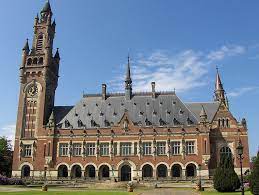International Court of Justice is the principal judicial body of the UN.
It was established in 1945 with the aim of settling legal disputes between states in a peaceful manner, promoting the rule of law, and providing advisory opinions on legal questions referred to it by the UN and other international organizations.

The ICJ consists of 15 independent judges elected by the UN General Assembly and the Security Council for nine-year terms. The court is based in The Hague, Netherlands and its jurisdiction extends to all states that have accepted its jurisdiction, currently numbering over 160 states.
The ICJ handles cases related to a wide range of topics, including border disputes, maritime delimitation, human rights, and the interpretation and application of international treaties. Its decisions are binding on the parties to the dispute, and its judgments are considered authoritative interpretations of international law.
To initiate a case before the ICJ, states must agree to submit the dispute to the court’s jurisdiction. The court can also give advisory opinions upon request of the UN General Assembly, the Security Council, and other specialized UN agencies.
The ICJ plays an important role in maintaining international peace and security and strengthening the rule of law in international relations. Its decisions and advisory opinions have helped to clarify and promote the development of international law and have been widely respected and followed by states.
Members of the Court: It is composed of 15 judges elected to nine-year terms of office by the United Nations General Assembly and the Security Council. These organs vote simultaneously but separately.
In conclusion, the International Court of Justice is a vital institution for the resolution of legal disputes between states and for the promotion of the rule of law in the international community.
Important Links